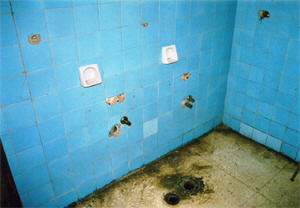Venezuelan president-cum-dictator Hugo Chavez continued his confiscation of private property and foreign investment yesterday by seizing oil projects and assimilating them into the state-owned petroleum organization. Delivering on his pledge to create a socialist state along the same lines as Fidel Castro’s Cuba, Chavez told foreign-owned firms that they now had to accept a minority stake in their own properties:
President Hugo Chavez ordered by decree on Monday the takeover of oil projects run by foreign oil companies in Venezuela’s Orinoco River region.
Chavez had previously announced the government’s intention to take a majority stake by May 1 in four heavy oil-upgrading projects run by British Petroleum PLC, Exxon Mobil Corp., Chevron Corp., ConocoPhillips Co., Total SA and Statoil ASA.
He said Monday that has decreed a law to proceed with the nationalizations that will see state oil company Petroleos de Venezuela SA, or PDVSA, taking at least a 60 percent stake in the projects.
“The privatization of oil in Venezuela has come to an end,” he said on his weekday radio show, “Hello, President.” “This marks the true nationalization of oil in Venezuela.”
Interestingly and not surprisingly, the Venezuelan strongman didn’t mention how he planned to compensate these companies for 60% shares of their projects. Instead, he told them that he didn’t want them to leave, and take all of their expertise and technology with them. Chavez wants them to accept the fact that they would do all the work while he gets most of the profits.
These projects were the only privately-financed oil production facilities in Venezuela, and their worth is estimated at $17 billion. Will Chavez send them a check for the $10.5 billion he owes for his share of their operations? Don’t bet on it. Chavez has offered compensation for other business assets that he has nationalized, but he has tried nothing on this scale so far.
Chavez’s diktat will take legal effect in four months, although Chavez says he’ll seize the projects by May 1. The companies have that long to negotiate terms with Chavez, who has an army to occupy the oil fields, making negotiations somewhat one-sided. The oil producers will likely try to strike a bargain with Chavez, but it makes little sense to do so. They will only be delaying the inevitable; Chavez will eventually steal it all from them. They should dismantle their operations and leave forthwith, taking the losses now and leaving Chavez to explain why the workers have lost their jobs as well as the expertise necessary to produce their primary export.

